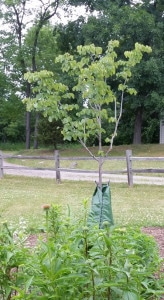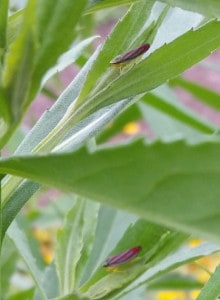
(Chelsea Update would like to thank Jennifer Fairfield of The Garden Mill for the information in this column. Part one ran yesterday.)
In the flower garden:
Keeping your flower beds watered is probably going to be your biggest task this month. A close runner up will be keeping insects at bay. Aphids have been a big issue for many of the people coming into the store this season, as well as in my own flower gardens.
In my vegetable garden, I reach for the insecticidal soap to combat these pests, as I don’t want to ingest the chemicals. In my flower beds, I may choose something will sometimes use something a little stronger, but there are a few things to keep in mind when choosing pesticides.
First, be sure you know what insect you are targeting. Not all insecticides will kill all insects, and some are far more lethal than may be necessary.
Second, be aware of when to apply. Different insects are active at different times of day, and some pesticides work best if sprayed directly on the pest.
Third, be aware of bee activity in your flowers, and don’t spray any insecticides when you see bees around, or at least do targeted spraying, instead of broadcast spraying, to avoid killing bees.

I came across an insect I had not seen before on my New England Asters last month. Not knowing whether it was a good guy or a bad guy, I had to do some investigating before deciding whether and what to do about it. Some poking around on the web allowed me to identify it as something called a candy-striped leaf hopper.
These guys, though pretty cool looking, are not very nice, as they can suck the life out of your plants. So, I pulled out the Espoma Insect Control, and will keep an eye on the plants in that flower bed for a while to make sure they didn’t have any friends.
Be sure to fertilize roses throughout the month, but stop fertilizing at the end of the month to allow the new growth to harden off before winter. Also remove diseased leaves immediately, and pick up any that have fallen. These tasks, along with regular fungicide spraying will help keep your roses healthy.
Keep weeds under control, as they compete with your flowers for moisture and nutrients.
Cut back perennials that have finished blooming.
Looking to fill in a spot in the garden quickly? Zinnia seeds planted this weekend will come up in a matter of days in the heat of July, will start producing blooms in just a few weeks, and will provide a beautiful late season show.
To keep your potted annual flowers looking great all summer long, be sure to fertilize them. With frequent watering, fertilizer tends to get flushed out of the container, so regular feedings are a must.
Also, don’t forget to deadhead. By removing dead flowers, you encourage the growth of new ones throughout the season.
And don’t forget to water.
Trees and Shrubs:
Regularly water any trees and shrubs planted this year. And if our dry conditions keep up, consider watering any trees and shrubs you planted in past years to keep them from becoming stressed leading into winter.
The one thing that is saving me lots of time and effort is the Tree Gators I put around the Rose Buds I planted late last fall. I can fill them up once and not have to think about watering the trees again for a whole week. These wonderful products let the water seep out slowly, which ensures that the water stays at the tree roots, rather than running off.
Do not apply fertilizer to trees or shrubs after the 4th of July, to avoid a flush of new growth that doesn’t have time to harden before winter.
Finish up pruning of trees and shrubs this month or early next. Pruning too late in the season can encourage new growth that will not have time to harden off before winter sets in.
Lawn:
If there is one good thing to say about the lack of rain we have been experiencing, it’s that mowing doesn’t need to be done as frequently. Actually, it’s much harder on the grass to mow it more frequently when it’s dry.
Keeping your grass a little higher under these conditions will help it retain moisture.
Actually, there is another good thing to say about the lack of rain. It is much harder for Japanese beetles to lay their eggs successfully in dry soil. That could mean fewer beetles next year.
I just saw my first Japanese beetle last week, quickly followed by about a dozen more a few days later. I’m betting that they won’t be the last. I truly detest these things.
The adults are voracious eaters that are not at all picky about what they eat. They will decimate raspberry canes, devour roses, gorge themselves on bean leaves, and basically consume anything in their paths. And if that wasn’t bad enough, the larva of these nasty creatures are the grubs that eat your grass roots, causing patches of brown, dead grass that is decidedly different looking from grass that is dormant.
Controlling the adult beetles is a thankless, essentially impossible task. The traps available everywhere mostly just attract the beetles to your yard. There really aren’t any insecticides that are effective against them, either.
You can pick them off your plants and throw them into a bucket of soapy water, but if you have a heavy infestation, that becomes a never-ending battle. Your best bet is to control their larvae (grubs), though it’s not an immediate solution.
For the Birds:
Birds need water, too. Keep your birdbaths full, and consider putting out additional baths or even filling things like overturned trash can lids or large saucers with water for them.
The dry conditions are equally difficult on birds, and they are going to be looking for water wherever they can find it. One place they may find it is in your vegetables. If you are finding holes in tomatoes, zucchini, and other “fruits” in your veggie garden, it may be birds (or other creatures, such as squirrels) looking for moisture.
Giving them a source of water may save your harvest. Just be sure to dump the water and refill it every day, to discourage mosquitoes from laying eggs.
Keep hummingbird feeders cleaned out and filled. Sugar water left out in the heat for a number of days can breed bacteria that is harmful to the beautiful birds visiting your feeders, so be sure to clean them out every few days.














